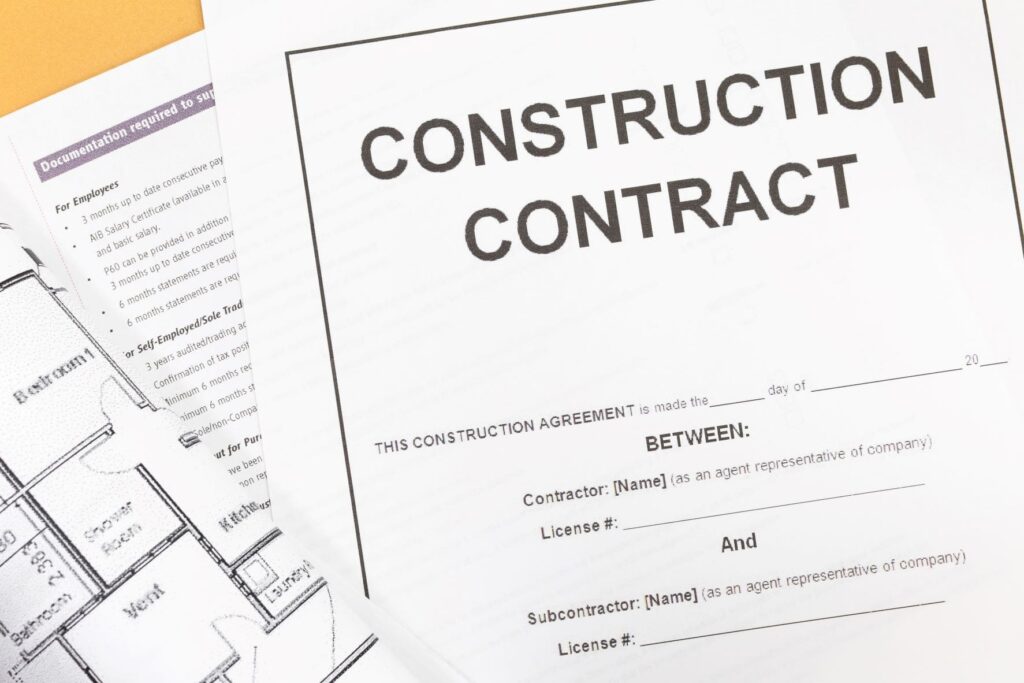The construction industry in Arizona is governed by a myriad of laws and regulations, ensuring projects are executed professionally and ethically. A critical aspect of every construction project is the contract, which outlines the rights, obligations, and responsibilities of each party involved. In Arizona, several standard forms of contract are commonly used. Here is our comprehensive guide to the standard forms of contract in construction in Arizona with an explanation of typical terms and conditions found in construction contracts and some important points on construction law.
Standard Forms of Contract in Construction in Arizona
While it is helpful to understand the most commonly used contracts in construction projects, keep in mind that it is always advisable to work with an experienced construction law attorney in that state to make sure the contract covers all the required details and provides the appropriate protections before executing.
1) American Institute of Architects (AIA) Contract Documents
AIA contracts are widely used and recognized across the United States, including Arizona. These documents are updated periodically to reflect changes in construction laws and industry practices. AIA contracts are comprehensive and flexible, offering numerous options for parties to choose from, depending on the project’s size, complexity, and specific needs.
2) ConsensusDocs
ConsensusDocs is another popular standard form of contract in the construction industry. Developed by a coalition of industry organizations, ConsensusDocs aim is to create fair and balanced contracts that promote collaboration and mitigate disputes. These contracts are known for their plain language and straightforward provisions, making them more accessible to all parties involved.
3) Engineers Joint Contract Documents Committee (EJCDC) Contracts
EJCDC contracts are developed by a joint committee of engineering professionals and are tailored to engineering and construction projects. These contracts provide a comprehensive set of documents that cover various aspects of engineering, bonds, design, and construction, and are often used for projects involving significant engineering components.
Key Details of Construction Law in Arizona
1) Licensing Requirements
In Arizona, contractors are required to hold a valid license issued by the Arizona Registrar of Contractors (ROC) to perform construction work. Licensing ensures that contractors have the necessary skills, knowledge, and experience to perform construction work, and provides protection to consumers. The ROC categorizes licenses based on the type of work (residential, commercial, or dual), and different classifications are available depending on the trade or specialty.
2) Statute of Repose
Arizona has a statute of repose, which sets a time limit for filing a lawsuit related to construction defects. Under Arizona law, the statute of repose is generally eight years from the substantial completion of the project. However, in cases where the latent defect is discovered within the last year of the eight-year period, a claimant has one additional year to file a lawsuit.
3) Prompt Payment Act
Arizona’s Prompt Payment Act requires owners and contractors to make timely payments to subcontractors and suppliers. The law stipulates that owners must pay contractors withinso many days of receiving an undisputed payment request, and contractors must pay subcontractors within another set time of receiving payment from the owner. Subcontractors and suppliers can charge 1.5% interest per month on those invoices that are not paid within that time frame.
4) Mechanics’ Liens
Mechanics’ liens offer contractors, subcontractors, and suppliers a legal remedy when they are unpaid for their work or materials. In Arizona, the process is very technical and it is imperative you follow the proper rules. For instance, in order to preserve payment and lien rights, you must serve the property owner with a preliminary 20-day notice within 20 days of commencing work or delivering materials in order to protect such work and qualify for the ability to eventually record a mechanic’s lien. You also need to record the mechanics’ lien within 120 days from the last day of work or the last day of providing materials. To foreclose the lien, you must file a lawsuit within six months of recording the lien. Again, the statutes govern the procedure and must be strictly complied with in order to protect and enforce lien rights. This article is simply an informative guide and not meant to be relied upon.
Typical Terms and Conditions in Arizona Construction Contracts
1) Scope of Work
The scope of work details all aspects of a construction project, including the specific tasks, activities, and responsibilities of each party. It typically includes a detailed description of the work to be performed, materials to be used, and specific requirements for that project. Working with a construction attorney to clearly define all the requirements in the scope of work can help avoid many common issues and misunderstandings down the road.
2) Payment Terms
Payment terms outline the payment methods, expected amounts and payment dates for the project. In Arizona, construction contracts often include progress payments, which are made at specific milestones or intervals during the project. Payment terms should include the schedule for submitting payment applications, retainage provisions, and the process for handling disputed amounts.
3) Change Orders
Change orders are common in construction contracts as all parties need a clear path to address modifications to the original scope of work. The contract should establish a clear process for requesting, approving, and documenting change orders, including the method for determining the cost and time impact of the change. Many times, contracts require change orders to be in writing and signed by both parties. However, situations can occur where oral modification can be enforced. Contact an attorney during the construction process in order to best know your rights.
4) Warranty
A warranty in a construction contract provides a guarantee that the work will be free from defects and will conform to the specifications for a specified period. In Arizona, implied warranties, such as the warranty of workmanship and the warranty of habitability, are included in contracts unless expressly disclaimed. The contract may also include express warranties, which specifically outline the contractor’s obligations and, importantly, the duration of the warranty.
5) Indemnification
Indemnification provisions allocate risk and liability between the parties involved in a construction project. Arizona law allows for broad indemnification clauses, provided they do not indemnify a party for their own sole negligence. The contract should clearly outline the scope and extent of the indemnification and the process for handling indemnification claims.
6) Insurance and Bonding
Insurance and bonding requirements protect the parties from financial risks associated with the project. Arizona construction contracts typically require contractors to carry general liability insurance, workers’ compensation insurance, and, in some cases, professional liability insurance. Additionally, contractors may be required to provide performance and payment bonds to ensure the project’s completion and the payment of subcontractors and suppliers.
7) Termination
Termination provisions specify the conditions under which a party may terminate the contract. Common grounds for termination include material breach, non-payment, bankruptcy, and force majeure events. The contract should outline the process for providing notice of termination and the consequences of termination, such as the right to withhold payments or recover damages.
8) Dispute Resolution
Dispute resolution clauses outline the methods for resolving disputes between the parties, such as mediation and/or arbitration. The contract should clearly define the process and procedures for initiating dispute resolution and any applicable timelines or deadlines. In a previous post, we detailed some of the most important things to understand about common construction disputes and how to handle them.
9) Governing Law and Venue
The governing law and venue provisions establish which state’s laws will apply to the contract and where any legal disputes will be resolved. In Arizona construction contracts, the governing law is typically the laws of the State of Arizona, and the venue is often specified as the county where the project is located.
The Importance of Experienced Construction Law Attorneys for Construction Contracts
Understanding the standard forms of contract in construction in Arizona, as well as key details of construction law and typical terms and conditions in construction contracts, is essential for anyone involved in construction projects. Construction contracts can be complicated and the project’s success often depends on getting every detail correct. This is why it is essential to work with an experienced construction law attorney that can help draft and review every contract for a construction project and make sure that all parties are completing their obligations. The attorneys at RSN Law have decades of experience with complicated construction contracts and successful dispute resolution. Contact RSN Law today at 480-712-0035 to schedule an initial consultation for your construction needs or make an appointment on our contact us page.
RSN Law intends this article to be for informational purposes, not to be relied on a specific legal matter, and does not create an attorney-client relationship.

